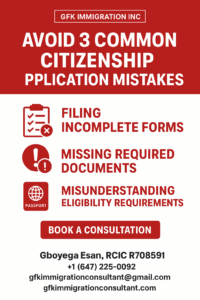
Avoid three Citizenship Application Mistakes
Applying for Canadian citizenship is a significant milestone for permanent residents, but the process can be complex and prone to delays if not handled carefully.
Immigration, Refugees, and Citizenship Canada (IRCC) processes thousands of applications annually, and errors or oversights can lead to prolonged wait times or even refusals.
With a backlog of over 47,400 citizenship applications as of early 2025, understanding potential complications and how to address them is crucial for a smooth journey to citizenship.
This comprehensive guide explores the most common factors that complicate Canadian citizenship applications, offers actionable solutions to avoid delays, and provides expert tips to strengthen your submission.
Whether you’re navigating documentation requirements, addressing inadmissibility concerns, or ensuring timely attendance at citizenship tests, this article will equip you with the knowledge to succeed.
Table of Contents
Why Canadian Citizenship Applications Get Delayed
Canadian citizenship applications are evaluated based on strict eligibility criteria, including physical presence, language proficiency, and adherence to legal requirements.
While routine applications currently take around eight months to process, “non-routine” or complex cases can take significantly longer.
According to IRCC, three primary factors contribute to delays:
Incomplete or Insufficient Documentation: IRCC may request additional documents if your application lacks critical information or evidence.
Missing a Citizenship Test, Interview, or Hearing: Failing to attend scheduled appointments can lead to delays or application closure.
Criminal, Security, or Admissibility Issues: Concerns about criminality or misrepresentation can complicate or halt your application.
Below, we break down each factor, explain why it matters, and provide practical steps to avoid these pitfalls.
Incomplete or Insufficient Documentation
One of the most common reasons for delays is submitting an incomplete application.
IRCC requires specific documents to verify your eligibility and ensure you meet residency, language, and identity requirements.
If any document is missing or unclear, IRCC will request additional information, adding months to your processing time.
Key Documents for a Canadian Citizenship Application
To avoid delays, ensure your application includes all required documents in the correct format.
Below is a detailed checklist of mandatory documents:
Citizenship Application Form: Submit the Application for Canadian Citizenship (CIT 002).
Physical Presence Calculation: Include a printout of the online Physical Presence Calculator or Form CIT 0407, proving you’ve lived in Canada for at least 1,095 days (three years) in the past five years.
Passport or Travel Documents: Provide colour copies of all passport pages (or equivalent travel documents) covering the five years before your application.
If unavailable, include an explanation in the application.
Proof of Language Proficiency (CLB 4 or Higher): Submit one of the following:
IRCC-approved language test results (e.g., IELTS, CELPIP, or TEF).
Diploma, certificate, or transcript from post-secondary studies in English or French.
Proof of achieving CLB 4 through a government-funded language program.
Personal Identification: Provide photocopies of two IDs showing your name, photo, and date of birth (e.g., passport biographical page, PR card, driver’s license, or health card).
Citizenship Photos: Include two identical photos (50 mm x 70 mm) meeting IRCC’s strict quality requirements (clear, sharp, no shadows, natural skin tones).
Fee Receipt: Pay the application fee online and include the receipt.
Document Checklist: Complete and include Form CIT 0007 to confirm all documents are provided.
Additional Documents (If Applicable)
Depending on your circumstances, you may need to submit extra documents, such as:
Use of a Representative Form (IMM 5476): Required if you’re using an immigration consultant or lawyer.
Police Certificates: Needed for any country where you spent 183+ days in a row (aged 18 or older) in the four years before applying.
Legal Name Change Documents: Include marriage certificates, court orders, or adoption orders if your name has changed.
Date of Birth or Gender Correction: Submit Form IRM 003 or IRM 002 to correct discrepancies.
Residence Outside Canada as a Crown Servant: Use Form CIT 0177 if you worked for the Canadian government or lived with a Crown servant family member abroad.
Guardianship Documents: For minors, include power of attorney, court orders, or affidavits proving guardianship.
Waiver Requests: If you can’t meet language, knowledge, or oath requirements due to medical or compassionate reasons, submit Form CIT 0116 and supporting evidence (e.g., Medical Opinion Form CIT 0547).
Tips to Avoid Documentation Delays
Double-Check the Checklist: Use IRCC’s document checklist (CIT 0007) to ensure nothing is missing.
Include Translations: For non-English or non-French documents, provide certified translations with an affidavit from the translator.
Submit High-Quality Scans: Ensure all documents are clear, legible, and in color (where required).
Anticipate Requests: If you suspect IRCC might need extra evidence (e.g., for travel history or language skills), include supporting documents upfront.
Keep Copies: Retain copies of all documents and proof of submission for your records.
By submitting a complete application, you reduce the chance of IRCC requesting additional documents, which can delay processing by weeks or months.
Missing a Citizenship Test, Interview, or Hearing
Attending scheduled citizenship tests, interviews, or hearings is mandatory.
Missing these appointments can lead to significant delays, application closure, or the need to reapply with new fees.
Why Attendance Matters
Citizenship Test: Applicants aged 18–54 must pass a test on Canadian history, geography, and civic responsibilities.
Missing the test can exhaust your attempts or close your application.
Citizenship Interview: IRCC may schedule an interview to verify information or clarify discrepancies.
Non-attendance can lead to application abandonment.
Citizenship Hearing: In complex cases, a hearing with a citizenship officer or judge may be required. Failure to attend can result in a refusal.
What to Do If You Miss an Appointment
IRCC provides specific instructions for rescheduling or explaining missed appointments:
Missed Citizenship Test:
Online Test: If you miss the first attempt, IRCC automatically invites you to retake it within 30 days (up to three attempts).
If you miss the second attempt, contact IRCC via the email in the “Rescheduling” section of your invitation with a valid reason.
Failure to do so after two missed tests closes your application.
Paper Test: If you miss the first paper test, contact IRCC to reschedule.
For a missed retest, follow the same process with a reasonable explanation.
Missed Citizenship Interview: Write a letter explaining your absence and send it to the IRCC office that scheduled the appointment (via mail or IRCC’s online web form).
Check the notice for the deadline to respond. If you miss this deadline, your application will be closed.
Missed Citizenship Hearing: Notify the scheduling office immediately, providing a reason for your absence.
The notice will outline contact details and consequences of non-attendance.
Tips to Avoid Missing Appointments
Mark Your Calendar: Record all appointment dates and set reminders.
Check Notifications: Monitor your email (including spam/junk folders) and physical mail for IRCC notices.
Plan Ahead: Arrange transportation, childcare, or work leave to ensure availability.
Update Contact Info: Ensure IRCC has your current email and mailing address to avoid missed notifications.
Act Quickly: If you can’t attend, contact IRCC as soon as possible to reschedule.
Prompt communication with IRCC can prevent your application from being abandoned, saving you time and money.
Criminal, Security, or Admissibility Issues
Inadmissibility concerns, such as criminal convictions or misrepresentation, can complicate or disqualify your citizenship application.
Under Canada’s Citizenship Act, certain conditions make you ineligible, while others require legal remedies to proceed.
Common Inadmissibility Issues
Criminal Inadmissibility: Convictions for serious crimes (e.g., indictable offences in Canada or equivalent abroad) can bar you from citizenship.
Security Concerns: Activities like espionage, terrorism, or organized crime can lead to ineligibility.
Misrepresentation: Providing false information or omitting key details (even unintentionally) can result in a five- to ten-year ban on citizenship applications.
How to Address Inadmissibility
If you face inadmissibility, consider these legal options:
Criminal Rehabilitation Application: This permanently clears your criminal record for immigration purposes if:
You committed a crime that would be an offence under Canadian law.
You were convicted of or admitted to the crime.
At least five years have passed since completing your sentence.
A successful application removes inadmissibility, allowing you to proceed with your citizenship application.
Legal Opinion Letter: A Canadian immigration lawyer can write a letter explaining your conviction’s immigration consequences, referencing Canadian law.
It may propose alternative charges or appeal for leniency, especially if the conviction affects your family or employment in Canada.
Temporary Resident Permit (TRP): If you’re ineligible for rehabilitation (e.g., less than five years since sentencing), a TRP may allow temporary entry or residency, but it doesn’t resolve citizenship ineligibility.
Avoiding Misrepresentation
Misrepresentation is a serious issue that can derail your application. To protect yourself:
Be Honest: Disclose all required information, even if it seems minor (e.g., previous visa refusals or criminal charges).
Review Your Application: Double-check for errors or omissions before submitting.
Seek Professional Help: An immigration lawyer can ensure your application is accurate and complete.
Tips to Address Inadmissibility
Disclose Criminal History: Include police certificates and court documents for transparency.
Consult a Lawyer: An experienced immigration lawyer can assess your admissibility and recommend solutions like rehabilitation or legal opinion letters.
Act Early: Address inadmissibility issues before applying to avoid complications.
Keep Records: Maintain documentation of any legal proceedings, pardons, or rehabilitation approvals.
By proactively addressing inadmissibility, you can strengthen your application and avoid delays or refusals.
The Role of an Immigration Lawyer
While you can submit a citizenship application on your own, hiring an experienced immigration lawyer can be a game-changer, especially for complex cases.
A lawyer can:
Ensure Completeness: Review your application to confirm all documents are included and accurate.
Assess Eligibility: Identify potential red flags (e.g., inadmissibility or insufficient physical presence) before you apply.
Handle Complications: Provide guidance if you miss an appointment or face inadmissibility issues.
Prepare Legal Documents: Draft legal opinion letters or criminal rehabilitation applications.
Avoid Misrepresentation: Ensure your application is truthful and comprehensive to prevent bans.
When to Hire a Lawyer?
Consider professional help if:
You have a criminal record or admissibility concerns.
Your travel history is complex, making physical presence hard to prove.
You’re requesting a waiver for language, knowledge, or oath requirements.
You’ve missed a test, interview, or hearing and need to salvage your application.
You want peace of mind that your application is error-free.
A reputable firm with decades of experience, like Cohen Immigration Law, can provide tailored advice and increase your chances of success.
Additional Tips for a Successful Citizenship Application
Beyond addressing the three main complications, these strategies can streamline your application:
Start Early: Gather documents and calculate physical presence well before applying to identify gaps.
Use IRCC Tools: Leverage the online Physical Presence Calculator and document checklists to stay organized.
Monitor Your Application: Check your application status online via IRCC’s portal and respond promptly to requests.
Prepare for the Test: Study the Discover Canada guide to ace the citizenship test on your first attempt.
Stay Compliant: Avoid legal issues during processing, as new convictions can affect your eligibility.
Your Path to Canadian Citizenship
Becoming a Canadian citizen is an exciting step, but the application process demands precision and diligence.
By submitting a complete application, attending all required appointments, and addressing inadmissibility concerns upfront, you can minimize delays and increase your chances of approval.
For complex cases, an immigration lawyer can provide invaluable support, ensuring your application is robust and error-free.
Ready to take the next step?
Schedule a free consultation with a trusted immigration firm or visit IRCC’s website for official resources.
With careful planning and attention to detail, you’ll soon be proudly swearing the Oath of Citizenship.
